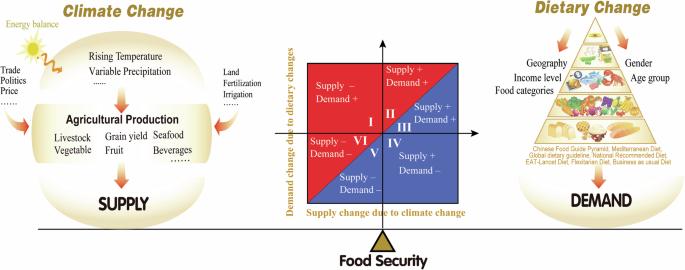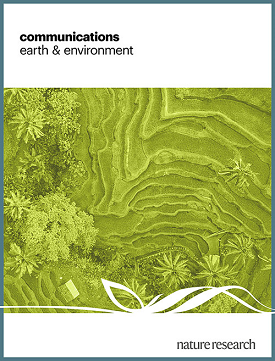Dissecting the vital role of dietary changes in food security assessment under climate change
IF 8.9
1区 地球科学
Q1 ENVIRONMENTAL SCIENCES
引用次数: 0
Abstract
National and global food security depend on both supply and demand, yet the vast majority of studies on the impact of climate change on food security have focused somewhat myopically on the supply side. Here, we assess planetary implications of the changing climate for food supply, concurrently considering implications of shifts in dietary preferences on food security. From 1990 to 2018, climate change detrimentally impacted on the food production of 92% of nations assessed. During this time, demand decreased at a greater rate than food supply in 28% of countries; food security for 35% of the global population was unperturbed by climate change. On the other hand, 2% of the global population did not benefit from positive impacts of climate change on food production, due to dietary changes faster increasing food demand. If consumers shift dietary preferences en masse towards healthier diets, detrimental impacts of the climate crisis on food security may be abated, although en mass and/or abrupt transitions in dietary preferences are unlikely. Dietary changes can potentially alleviate climate change’s impact on global food supply, benefiting up to 42% of the global population and potentially addressing the food security crisis, according to assessment of dietary changes’ impact on food security.

剖析膳食变化在气候变化下粮食安全评估中的重要作用
国家和全球粮食安全取决于供应和需求两方面,然而绝大多数关于气候变化对粮食安全影响的研究都侧重于供应方面。在此,我们评估了气候变化对全球粮食供应的影响,同时考虑了饮食偏好变化对粮食安全的影响。从 1990 年到 2018 年,气候变化对 92% 被评估国家的粮食生产造成了不利影响。在此期间,28%的国家粮食需求的下降速度超过了粮食供应的下降速度;35%的全球人口的粮食安全没有受到气候变化的影响。另一方面,全球有 2% 的人口没有从气候变化对粮食生产的积极影响中受益,原因是 饮食习惯的改变加快了粮食需求的增长。如果消费者的饮食偏好大规模转向更健康的饮食,那么气候危机对粮食安全的不利影响可能会减弱,尽管饮食偏好的大规模和/或突然转变不太可能发生。根据饮食变化对粮食安全影响的评估,饮食变化有可能减轻气候变化对全球粮食供应的影响,使全球多达 42% 的人口受益,并有可能解决粮食安全危机。
本文章由计算机程序翻译,如有差异,请以英文原文为准。
求助全文
约1分钟内获得全文
求助全文
来源期刊

Communications Earth & Environment
Earth and Planetary Sciences-General Earth and Planetary Sciences
CiteScore
8.60
自引率
2.50%
发文量
269
审稿时长
26 weeks
期刊介绍:
Communications Earth & Environment is an open access journal from Nature Portfolio publishing high-quality research, reviews and commentary in all areas of the Earth, environmental and planetary sciences. Research papers published by the journal represent significant advances that bring new insight to a specialized area in Earth science, planetary science or environmental science.
Communications Earth & Environment has a 2-year impact factor of 7.9 (2022 Journal Citation Reports®). Articles published in the journal in 2022 were downloaded 1,412,858 times. Median time from submission to the first editorial decision is 8 days.
 求助内容:
求助内容: 应助结果提醒方式:
应助结果提醒方式:


